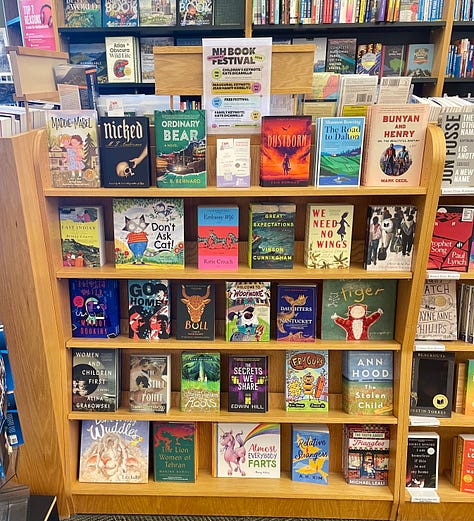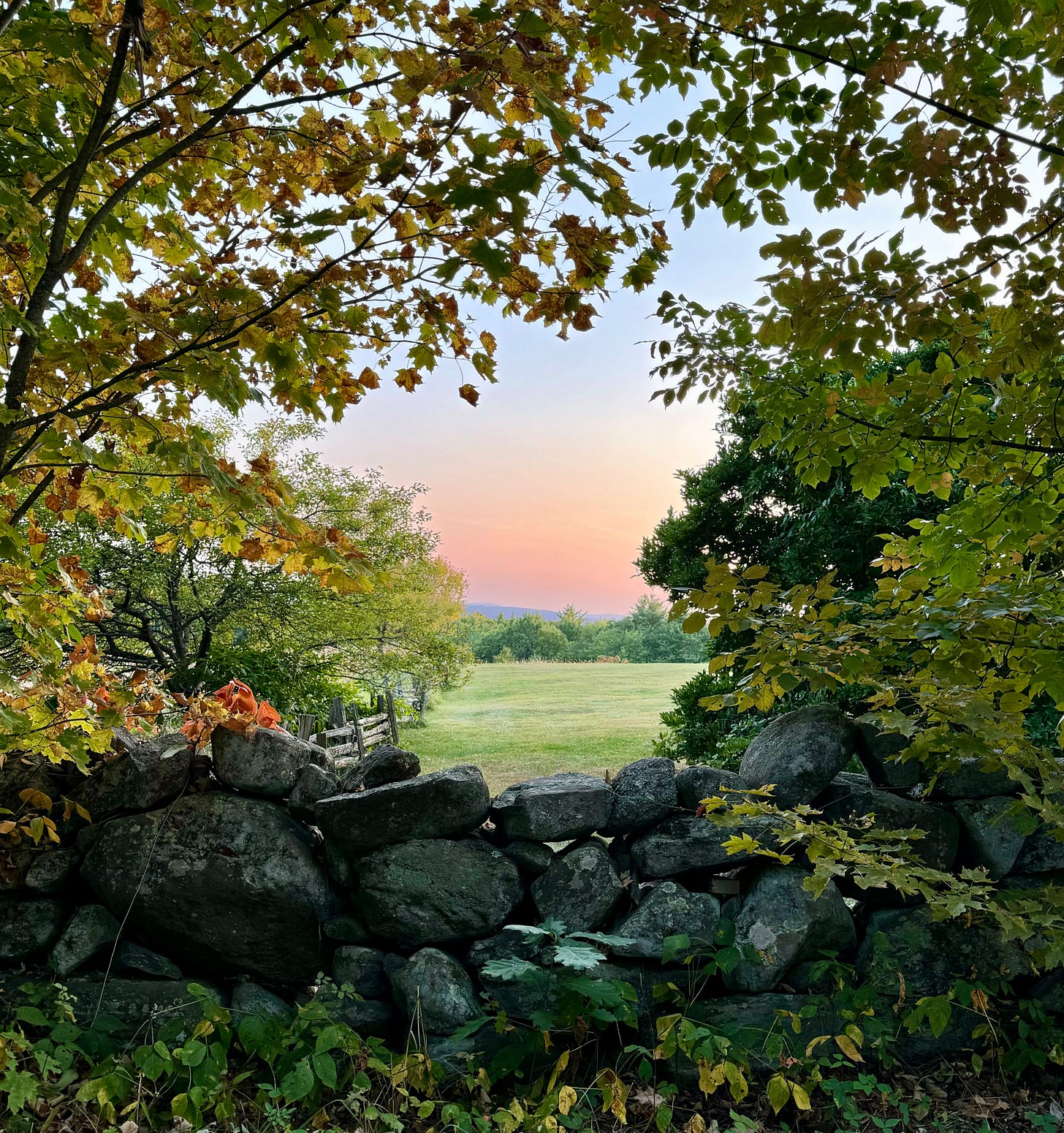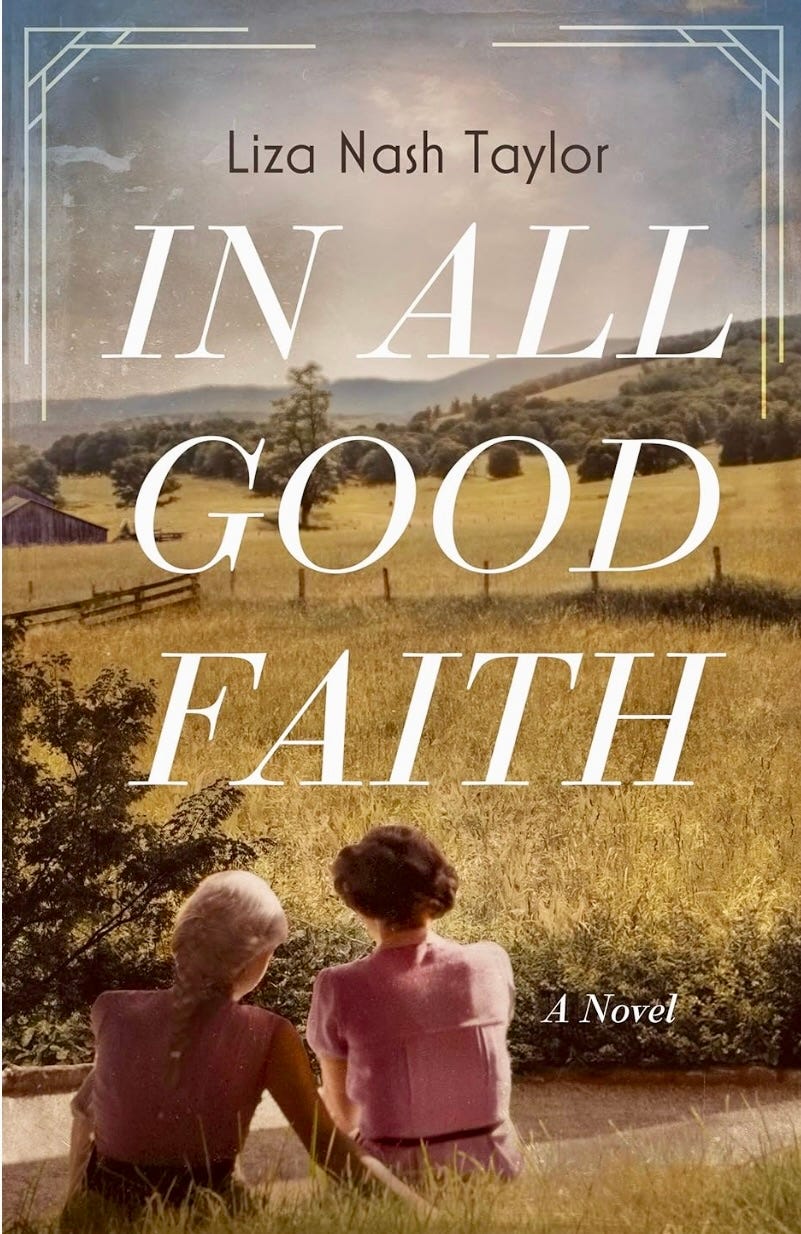An inspiring second act: A Midlife Author interview with Liza Nash Taylor
Plus: our book-festival baby, the New Hampshire Book Festival, is almost here!
I like to call it the emotional file cabinet. You know—that place in your brain where we store the memory of our first heartbreak and that time we got fired. The highest highs and lowest lows. The shame. Now that I’m in my sixties, I have a hell of a lot more files in that cabinet than I did in my twenties.
—Liza Nash Taylor
For this month’s Midlife Author interview, we’ll hear from novelist Liza Nash Taylor. Liza turned to writing after a career that’s surely full of its own stories: she worked as a designer for Ralph Lauren in New York City in the 1980s, the height of the preppy-Lauren-chic era, and later owned an antiques shop on “Petticoat Row” on Nantucket.
I met Liza through a mutual writer friend—we’d all studied in the same MFA program, VCFA, though we hadn’t overlapped. Liza and I had first novels coming out a month apart in 2020, a confusing, far-from-ideal time to publish a first book. As my pub day approached, I studied Liza’s virtual events, and followed her lead; she made it all look easy, in a time when hardly any writers (or bookstores, or publishers) had gotten the hang of virtual book events.
Liza is the author of two historical novels, Etiquette for Runaways (Blackstone, 2020) and In All Good Faith (Blackstone, 2021), both set partly in rural central Virginia, where she lives.
Liza won a 2018 fellowship to the Hawthornden Foundation, and is the 2016 winner of the San Miguel Writing Conference Fiction Prize. Her short work has run in Gargoyle, Deep South, and Ekphrastic Review, and she teaches at Writer House, in Charlottesville, VA. She’s also a fashion historian and has lectured about fashion at Historical Novel Society conferences. She holds degrees from Mary Baldwin University, Fashion Institute of Technology, and Vermont College of Fine Arts.
Liza writes about writing craft and the publishing journey for Writer Unboxed. Her recent essay “Not Being a Writer: An Experiment” chronicles her decision to leave her agent, and what came after. It’s a bracing, funny reminder of the no-guarantees, twisty path of writing and publishing. Here’s a snippet:
“This was a crossroads moment. My third novel has been under construction for three years, and it hasn’t come easily. Soon, I’ll turn sixty-five. Instead of writing, I could use my time to make dollhouses and to garden. Maybe I could become a more interactive grandmother. Maybe I’d order a Jitterbug flip phone and take up Prancercizing!”
Hi Liza! Tell us about your writing journey. When did fiction writing start calling to you more insistently?
From childhood, I’ve been an avid reader. I secretly longed to be an abandoned English orphan.
But fast forward to my early fifties: I had a neck injury that required 20 minutes flat on my back in traction, every day for a year. I started listening to audiobooks during that time, and fell in love with English narrators reading Dickens. All of Dickens. I listened to a trove of classic novels.
I wanted to discuss these books so I signed up for a literature class at my local community college. That led to working toward a degree, and that led to my first creative writing class, about nine years ago, where I began what became my first novel. When the class ended, I felt pulled to finish the story I’d begun. I applied to a low-residency MFA program at Vermont College of Fine Arts, which I finished in 2018.
What do you know now as a writer that you wish you’d known starting out?
Oof. SO much. When I finished my first novel and started querying the manuscript, I knew absolutely nothing about working with an agent or the publication process. I didn’t know how vulnerable I’d feel once my novels went out into the world.
What makes a midlife writer a stronger writer?
Life experience: I like to call it the emotional file cabinet. You know—that place in your brain where we store the memory of our first heartbreak and that time we got fired, etc. The highest highs and lowest lows. The shame. Now that I’m in my sixties, I have a hell of a lot more files in that cabinet than I did in my twenties. That’s not to say that young writers can’t tap those emotions. Of course they can.
Can you share your advice for someone who’s just getting started with writing, or who thinks it’s too late?
Read! Literature, popular novels, craft books. Take courses. Go to workshops, conferences, and retreats and befriend fellow writers, be they more or less experienced than you are. Ask for input and return the favor. Follow the marketplace.
Tell us about your most recent book.
My second novel, In All Good Faith, came out in 2021 from Blackstone Publishing. It’s set in the Great Depression and tells parallel stories of a struggling young mother and businesswoman and a teenaged girl on her own. Their shared experiences help them find success in hard times.
Right now, I’m revising another historical novel. It’s set in 1954 in Paris and New York. Here’s the hook: While an elaborate web of family secrets and lies unravels over the course of one transformational year in Paris. A naïve American girl grapples with ambition, heartbreak, and the heaviness of both loyalty and betrayal.
And tell us about a book that you think deserves more attention.
Getting back to my riff on young writers and emotion, I was blown away by a debut novel that came out in 2022, called Maps of Our Spectacular Bodies, written by Maddie Mortimer. She’s British and was born the same year as my daughter, in 1996. She wrote the novel when she was twenty-four, inspired by diaries her mother kept while dying of cancer. The disease itself is a character in the novel and Mortimer’s writing is achingly evocative and also bravely experimental in places. This novel was shortlisted for the 2022 Booker Prize and was the winner of the Desmond Elliott Prize, and shortlisted for The Goldsmiths Prize. I met Maddie at a writing workshop in Yorkshire, England.
Last month’s Midlife Author interview, below:
New Hampshire Book Festival
As I mentioned a while back, I’ve gotten involved in planning a new book festival, the New Hampshire Book Festival, and the inaugural festival is around the corner—next weekend, Oct. 4 and 5. We have such a stellar lineup of authors that I can hardly believe it. If you’re in New England, please come! Saturday is the main festival day, a full day’s worth of free author panels, conversations, book signings, activities for kids, food trucks, vendors.



And we have two incredible ticketed keynote events: Friday night with NY Times-bestselling novelist Jean Hanff Korelitz, who will be in conversation with longtime NH Public Radio host Laura Knoy about Jean’s latest literary thriller The Sequel (sequel to her blockbuster literary thriller The Plot). Each ticket includes a copy of the brand-new book, which comes out 10/1.
And Saturday evening, a family keynote with the two-time Newbery medalist Kate DiCamillo, who will be in conversation with the Boston Globe editor Veronica Chao about her book The Magician’s Elephant and its journey to a Netflix movie, followed by a screening of the movie.
I’ll leave you with the view from the other day, looking over our stone wall and into our field, and a September poem. I think of September as the Emily Dickinson of months.

The morns are meeker than they were
The morns are meeker than they were -
The nuts are getting brown -
The berry’s cheek is plumper -
The rose is out of town.
The maple wears a gayer scarf -
The field a scarlet gown -
Lest I sh'd be old-fashioned
I’ll put a trinket on.
—Emily Dickinson








Thanks for such an interesting post Sarah and I LOVE that poem by Emily Dickinson. Makes me want to seek out some brightly coloured layers!
Sarah I so enjoyed this interview and look forward to catching up to more. And congrats on the writing and book festival! Well done!